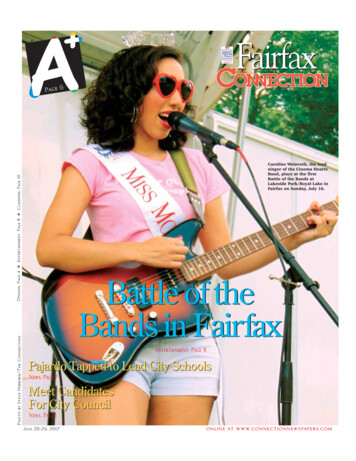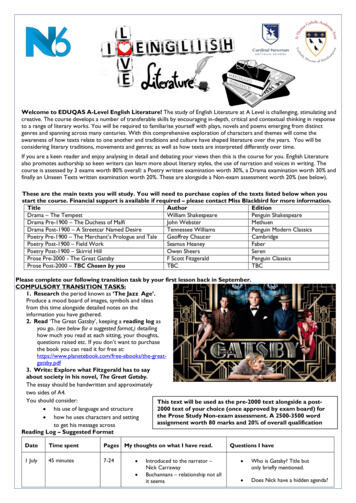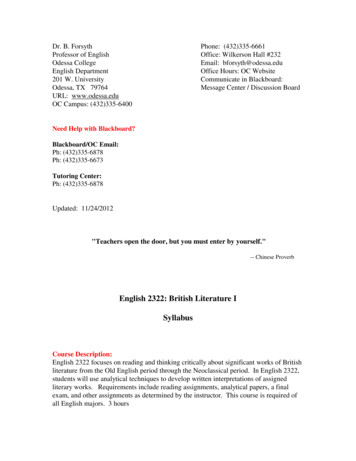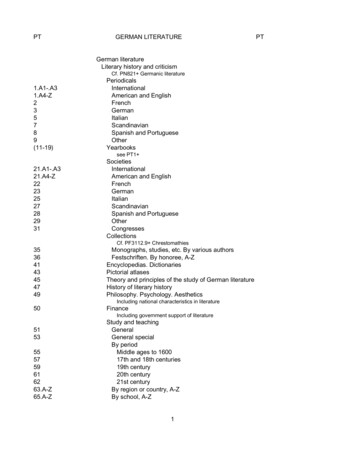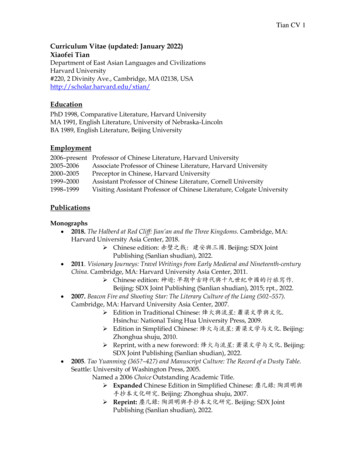
Transcription
A Level English LiteratureUnseen prose extract bookletThis booklet contains extracts and exam-style questions tohelp prepare you for English Literature A Level.
Extract OnePride and Prejudice by Jane Austen (1775-1817) was published in 1813. The story is set inEngland in the early 19th Century. The novel follows the fortunes of the Bennet family andspecifically the second-eldest daughter, Elizabeth. She meets the rich and arrogant MrDarcy and they seem to take an instant dislike to each other.In this extract, which takes place while Elizabeth is visiting her friend, Charlotte, Darcy,reluctantly, proposes marriage to Elizabeth.Examine the view that Austen presents Elizabeth as a strong character who will not settlefor someone she does not love.Make close reference to the writer’s methods in your response.(25 marks)After a silence of several minutes he came towards her in an agitated manner, and thusbegan, “In vain have I struggled. It will not do. My feelings will not be repressed. You mustallow me to tell you how ardently I admire and love you.”Elizabeth’s astonishment was beyond expression. She stared, coloured, doubted and wassilent. He spoke well, but there were feelings besides those of the heart to be detailed Hissense of her inferiority – of its being a degradation – were dwelt on with a warmth In spite of her deeply-rooted dislike, she could not be insensible to the compliment of such aman’s affection, and though her intentions did not vary for an instant, she was at first sorryfor the pain he was to receive; till, roused to resentment by his subsequent language, shelost all compassion in anger.“In such cases as this, it is, I believe, the established mode to express a sense of obligationfor the sentiments avowed But I cannot – I have never desired your good opinion, and youhave certainly bestowed it quite unwillingly I might as well enquire, why with so evident adesign of offending and insulting me, you chose to tell me that you liked me against yourwill, against your reason, and even against your character?.“Could you expect me to rejoice in the inferiority of your connections? To congratulatemyself on the hope of relations, whose condition in life is so decidedly beneath my own?”Elizabeth felt herself growing more angry every moment; yet she tried to the utmost tospeak with composure when she said,“You are mistaken, Mr Darcy, if you suppose that the mode of your declaration affected mein any other way, than as it spared me the concern which I might have felt in refusing you,had you behaved in a more gentlemanlike manner.”She saw him start at this, but he said nothing, and she continued,“You could not have made me the offer of your hand in any possible way that would havetempted me to accept it.”Again his astonishment was obvious; and he looked at her with an expression of mingledincredulity and mortification. She went on.
“From the very beginning, from the first moment I may almost say, of my acquaintance withyou, your manners impressing me with the fullest belief of your arrogance, your conceit,and your selfish disdain for the feelings of others; and I had not known you a month before Ifelt that you were the last man in the world whom I could ever be prevailed on to marry.”“You have said quite enough, madam. I perfectly comprehend you feeling, and have nowonly to be ashamed of what my own have been ” And with these words he hastily left theroom The tumult of her mind was now painfully great. She knew not how to support herself, andfrom actual weakness sat down and cried for half an hour She continued in very agitating reflections till the sound of Lady Catherine’s carriage madeher feel how unequal she was to encounter Charlotte’s observations, and hurried her awayto her room.
Extract TwoPersuasion by Jane Austen (1775-1817) was published posthumously in 1817. The story isset in England in the early 19th Century. The novel tells the story of Anne Elliot who, eightyears previously fell in love and became engaged to a naval officer, Frederick Wentworth.Her family persuade her to break off the engagement as he is poor and has no familyconnections. Eight years later, 27 year old Anne is unmarried and meets Wentworth againthrough friends. He is now well-connected, rich and has not forgiven Anne for rejectinghim.In this extract, which takes place in the house of Anne’s sister, Mary, Anne andWentworth meet again for the first time in eight years. Also present are Mary’s husband,Charles Musgrove and his two sisters, Henrietta and Louisa. Wentworth and Charles aregoing shooting.Examine how Austen presents Anne’s loss and her guilt about her past actions.Make close reference to the writer’s methods in your response.(25 marks)Her eye half met Captain Wentworth’s, a bow, a curtsey passed; she heard his voice; hetalked to Mary, said all that was right, said something to the Miss Musgroves, enough tomark an easy footing; the room seemed full, full of persons and voices, but a few minutesended it. Charles shewed himself at the window, all was ready, their visitor had bowed andwas gone; the Miss Musgroves were gone too, suddenly resolving to walk to the end of thevillage with the sportsmen: the room was cleared, and Anne might finish her breakfast asshe could.“It is over! It is over!” she repeated to herself again and again, in nervous gratitude. “Theworst is over!”Mary talked, but she could not attend. She had seen him. They had met. They had beenonce more in the same room!Soon, however, she began to reason with herself, and try to be feeling less. Eight years,almost eight years has passed, since all had been given up. How absurd to be resuming theagitation which such an interval had banished into distance and indistinctness! What mightnot eight years do? Events of every description, changes, alienations, removals – all, all mustbe comprised in it; and oblivion of the past – how natural, how certain too! It included athird part of her own life.Alas! With all her reasoning, she found, that to retentive feelings eight years may be littlemore than nothing.Now, how were his sentiments to be read? Was this like wishing to avoid her? And the nextmoment she was hating herself for the folly which asked the question.
On one other question which perhaps her utmost wisdom might not have prevented, shewas soon spared all suspense; for after the Miss Musgroves had returned and finished theirvisit at the cottage she had this spontaneous information from Mary:“Captain Wentworth is not very gallant by you, Anne, though he was so attentive to me.Henrietta asked him what he thought of you, when they went away, and he said, you wereso altered he should not have known you again.”“Altered beyond his knowledge!” Anne fully submitted, in silent, deep mortification.Doubtless it was so; and she could take no revenge, for he was not altered, or not for theworse. She had already acknowledged it to herself, and she could not think differently, lethim think of her as he would. No; the years which had destroyed her youth and bloom hadonly given him a more glowing, manly, open look, in no respect lessening his personaladvantages. She had seen the same Frederick Wentworth.“So altered that he should not have known her again!” These were words which could notbut dwell with her He had thought her wretchedly altered, and in the first moment of appeal, had spoken as hefelt. He had not forgiven Anne Elliot. She had used him ill, deserted and disappointed him;and worse, she had shewn a feebleness of character in doing so, which his own decided,confident temper could not endure. She had given him up to oblige others. It had been theeffect of over-persuasion. It had been weakness and timidity.
Extract ThreeWuthering Heights by Emily Bronte (1818-1848) was published in 1847. The novel is set inYorkshire in the late 18th and early 19th Century. The novel tells the story of Heathcliff andCatherine who share an obsessive and destructive love. However, Catherine ends upmarrying a rich and well-connected man, Edgar Linton.In this extract, which takes place in Catherine and Edgar’s house and is narrated by theservant, Nelly, Heathcliff secretly visits Catherine with the help of Nelly, after hearing sheis ill, however she is pregnant.Examine how Bronte presents Heathcliff’s obsession with Catherine and the destructivenature of their relationship.Make close reference to the writer’s methods in your response.(25 marks)With straining eagerness Catherine gazed towards the entrance of her chamber. He did nothit the right room directly; she motioned me to admit him; but he found it out, ere I couldreach the door, and in a stride or two was at her side, and had her grasped in his arms.He neither spoke, nor loosed his hold, for some five minutes, during which period hebestowed more kisses than ever he gave in his life before, I dare say; but then my mistresshad kissed him first, and I plainly saw that he could hardly bear, for downright agony, to lookinto her face!“Oh, Cathy! Oh, my life! How can I bear it?” was the first sentence he uttered, in a tone thatdid not seek to disguise his despair.And now he stared at her so earnestly that I thought the very intensity of his gaze wouldbring tears into his eyes; but they burned with anguish, they did not melt.“You and Edgar have broken my heart, Heathcliff! And you both come to bewail the deed tome, as if you were the people to be pitied! I shall not pity you, not I. You have killed me –and thriven on it, I think. How strong you are! How many years do you mean to live after Iam gone?”Heathcliff had knelt on one knee to embrace her; he attempted to rise, but she seized hishair, and kept him down.“I wish I could hold you,” she continued bitterly, “till we were both dead! I shouldn’t carewhat you suffered. I care nothing for your sufferings. Why shouldn’t you suffer! I do! Willyou forget me – will you be happy when I am in the earth?”“Don’t torture me till I’m as mad as yourself,” cried he, wrenching his head free, andgrinding his teeth Are you possessed with a devil,” he pursued, savagely, “to talk in thatmanner to me, when you are dying? Do you reflect that all those words will be branded inmy memory, and eating deeper eternally, after you have left me? You know you lie to say Ihave killed you; and, Catherine, you know that I could as soon forget you, as my existence!
Is it not sufficient for your infernal selfishness, that while you are at peace I shall writhe inthe torments of hell?”“I’m not wishing you greater torment than I have, Heathcliff! I only wish us never to beparted – and should a word of mine distress you hereafter, think I feel the same distressunderground, and for my own sake, forgive me! Come here and kneel down again! Younever harmed me in your life. Nay, if you nurse anger, that will be worse to remember thanmy harsh words! Won’t you come here again? Do!”She bent round to look at him; he would not permit it; turning abruptly, he walked to thefireplace, where he stood, silent, with his back towards us His eyes wide, and wet at last, flashed fiercely on her; his breast heaved convulsively. Aninstant they held asunder; and then how they met I hardly saw, but Catherine made aspring, and he caught her, and they were locked in an embrace from which I thought mymistress would never be released alive He flung himself into the nearest seat, and on myapproaching hurriedly to ascertain if she had fainted, he gnashed at me, and foamed like amad dog, and gathered her to him with greedy jealousy. I did not feel as if I were in thecompany of a creature of my own species She put up her hand to clasp his neck, and bring her cheek to his, as he held her; while he, inreturn, covering her with frantic caresses, said wildly –“You teach me now how cruel you’ve been – cruel and false. Why did you despise me? Whydid you betray your own heart, Cathy? I have not one word of comfort – you deserve this.You have killed yourself. Yes, you may kiss me, and cry; and wring out my kisses and tears.They’ll blight you – they’ll damn you. You loved me – then what right had you to leave me?What right – answer me – for the poor fancy you felt for Linton? Because misery, anddegradation, and death, and nothing that God or Satan could inflict would have parted us,you, of your own will, did it. I have not broken your heart – you have broken it – and inbreaking it, you have broken mine. So much the worse for me, that I am strong. Do I want tolive? What kind of living will it be when you – oh God! Would you like to live with your soulin the grave?”
Extract FourJane Eyre by Charlotte Bronte (1816-1855) was published in 1847. The novel is set in thenorth of England in the late 18th and early 19th Century. It tells the story of Jane who goesto work as a governess at Thornfield Hall for the mysterious Mr Rochester.In this extract, which takes place in the grounds of Thornfield Hall, Rochester has informedJane that he is sending her away to be a governess in Ireland. She does not want to leavebut believes that she must because she thinks that Rochester is engaged to Miss Ingram.Examine how Bronte presents Jane and Rochester’s relationship and her anger at beingsent away in this extract.Make close reference to the writer’s methods in your response.(25 marks)“It is a long way to Ireland, Jane, and I am sorry to send my little friend on such wearytravels: but if I can’t do better, how is it to be helped? Are you something akin to me, do youthink, Jane?”I could risk no sort of answer by this time: my heart was full.“Because,” he said, “I sometimes have a queer feeling with regard to you – especially whenyou are near me, as now: it is as if I had a string somewhere under my left ribs, tightly andinextricably knotted to a similar string situated in the corresponding quarter of your littleframe. And if that boisterous channel, and two hundred miles or so of land come broadbetween us, I am afraid that cord of communion will be snapt; and then I’ve a nervousnotion I should take to bleeding inwardly. As for you, - you’d forget me.”“That I never should, sir: you know –“ impossible to proceed “Jane, do you hear that nightingale singing in the wood? – Listen!”In listening, I sobbed convulsively; for I could repress what I endured no longer: I wasobliged to yield; and I was shaken from head to foot with acute distress. When I did speak, itwas only to express an impetuous wish that I had never been born, or never come toThornfield.“I grieve to leave Thornfield: I love Thornfield: - I love it, because I have lived in it a full anddelightful life, - momentarily at least. I have not been trampled on. I have not been petrified.I have not been buried with inferior minds, and excluded from every glimpse of communionwith what it bright, and energetic, and high. I have talked, face to face, with what Ireverence; with what I delight in – with an original, a vigorous, an expanded mind. I haveknown you, Mr Rochester; and it strikes me with terror and anguish to feel I absolutely mustbe torn from you forever. I see the necessity of departure; and it is like looking on thenecessity of death.”“Where do you see the necessity?” he asked, suddenly.“Where? You, sir, have placed it before me.”“In what shape?”
“In the shape of Miss Ingram; a noble and beautiful woman, - your bride.”“My bride! What bride? I have no bride!”“But you will have.”“Yes; - I will! – I will!” He set his teeth.“Then I must go: - you have said it yourself.”“No: you must stay! I swear it – and the oath shall be kept.”“I tell you I must go!” I retorted, roused to something like passion. “Do you think I can stayto become nothing to you? Do you think I am an automaton? – a machine without feelings?And can bear to have my morsel of bread snatched from my lips, and my drop of livingwater dashed from my cup? Do you think, because I am poor, obscure, plain, and little, I amsoulless and heartless? – You think wrong! – I have as much soul as you, - and full as muchheart! And if God had gifted me with some beauty, and much wealth, I should have made itas hard for you to leave me, as it is now for me to leave you.”“Jane, be still; don’t struggle so, like a wild, frantic bird that is rending its own plumage in itsdesperation.”“I am no bird; and no net ensnares me; I am a free human being with an independent will;which I now exert to leave you.”“And your will shall decide your destiny,” he said: “I offer you my hand, my heart, and ashare of all my possessions I ask you to pass through life at my side – to be my second self,and best earthly companion.”
Extract FiveBirdsong by Sebastian Faulks (born 1953) was published in 1993. The novel is set in Franceand England and spans the years 1910 to 1979. It tells the story of Englishman StephenWraysford before, during and after World War I. Before the war Stephen goes to France towork for Rene Azaire and live with Azaire and his family.In this extract, which takes place at the Azaire house, Rene discovers that his wife,Isabelle, has been helping the strikers at his factory and that she has also been having anaffair with Stephen.Examine the way in which Faulks presents the marriage of Isabelle and Rene and Rene’sreaction.Make close reference to the writer’s methods in your response.(25 marks)“I heard the strangest story,” said Azaire abruptly.“What was that?” said Isabelle.“They told me that at the height of the strike someone was visiting little Lucien and wastaking his parcels of food to give to the dyers’ families.”“Yes, I heard that,” said Stephen. “A number of sympathetic people in the town helped thestrikers. There was one man in particular who wanted to be anonymous. So I was told at thefactory.”“Oh dear me no,” said Azaire. “This wasn’t a man, this was a woman, who used to go alongdisguised to wherever Lebrun lives.”“The strikers had help from many sources, I expect.”“But the strangest thing about this woman was that she was married to the owner of thefactory.” Azaire paused and looked round the table. Isabelle was motionless.“Now isn’t that a strange thing?” said Azaire raising his glass to his lips. “I couldn’t believe itwhen I heard it.”“I don’t think it’s strange,” said Isabelle. “It was me.”Stephen looked at her uncomprehendingly. Azaire replaced his wine glass heavily on thetable.“But my dear – ““I took them food because they were hungry. I had no idea of whether they should be onstrike or not, but I had seen their children asking for bread, running along behind the cartsbringing in vegetables to the market. I had seen them going through the dustbins in SaintLeu and I felt sorry for them.”Isabelle’s voice was surprisingly calm. She said, “I would do the same again, whether thepeople made cloth or shoes or anything else.”Azaire was white; his lips were a shade of pale purple as though even this soft membranehad repelled his blood.
Azaire stood up. “I discounted these rumours. I did not believe them, even though it wasyour name that was attached to them and I suppose I should have learned about you bynow. However wilful and selfish you are I could not believe that you would ever, everbehave towards me in such a way. And you, Monsieur, you had better leave the room.“No. Let him stay.”“Why? He’s – ““Let him stay.”A look of panic passed over Azaire’s face. He tried to speak, but failed. He drank again fromhis glass. His imagination seemed to be supplying more appalling possibilities than hispreviously controlled and teasing anger could admit.He struggled towards the worst question. He began it, “You ?” He looked towards Stephen,then down at the table. “I did not believe my wife could let me down in such a way. Thefurther reason I would not believe the rumours was that there was another piece of tittletattle that went with them, which said that the lady in question was also ” He waved hishand, as though swatting the thought away. “ enjoying some liaison with Lebrun.”“Not with Lucien. With Stephen.”Azaire looked up from his seat. “With.him?”“Yes.” Stephen looked evenly back at him. “With me. I pursued your wife. I seduced her. Youmust hate me not her.”Isabelle was no longer able to be cold towards Azaire. The brief sentences with which shehad informed him of her unfaithfulness seemed to have drained her resolve and she beganto weep and to apologise to him for what she had done. Stephen listened carefully to whatshe said. He did not begrudge Azaire his wife’s apologies but he did not want her to retreattoo far.Azaire was incapable of saying more than, “With him? Here?”Isabelle said, “I’m sorry so sorry, Rene. I meant you no harm. It is a passion for Stephen. Itwas not done to hurt you.”“This boy, this English boy? In my house? Where? In your bed?”“It doesn’t matter, Rene. It doesn’t matter where.”“It does to me. I want to know. Did you in which room?”“For God’s sake,” said Stephen.“And your father, Monsieur Fourmentier, what can he do ? What will they say? My God,my God.”Isabelle looked at Stephen and there was fear in her eyes. Stephen could see that she hadnot calculated what effect her sudden honesty would have on her husband. The fear was nodoubt partly for Azaire’s well-being but also seemed to be for herself: there was a chancethat in the crisis she might lose her resolution and follow some older code of conduct whichwould compel her to put herself once more at Azaire’s mercy.He was muttering to himself: “Bitch Your father told me and I never listened. In my ownhouse.”Stephen moved swiftly round the table and took him by the shoulders. “What can youexpect from a woman you have treated as you have treated Isabelle? Did you expect her tohumiliate herself for your pleasure, to sit meekly at your table in the knowledge that you
would beat her later This is a house where everything can be heard. How can you sit thereand call her names after what you’ve done to her?”
Extract SixThe Time Traveller’s Wife by Audrey Niffenegger (born 1963) was published in 2003. Thenovel is set in the USA between the 1970s and 2053. It tells the story of Henry DeTamblewho suffers from a genetic condition that causes him to time travel unpredictably. It isalso the story of his marriage to artist Claire Abshire and how his condition affects theirrelationship.In this extract, which takes place just after their wedding, Claire and Henry both act asnarrators as they express their thoughts and feelings about marriage.Examine how Niffenegger presents marriage in this extract.Make close reference to the writer’s methods in your response.(25 marks)March, 1994 (Clare is 22, Henry is 30)Claire: And so we are married.At first we live in a two-bedroom apartment in Ravenswood. It’s sunny, with buttercoloured hardwood floors and a kitchen full of antique cabinets and antiquated appliances.We buy things, spend Sunday afternoons in Crate & Barrel exchanging wedding presents,order a sofa that can’t fit thought the doors of the apartment and has to be sent back. Theapartment is a laboratory in which we conduct experiments, perform research on eachother. We discover that Henry hates it when I absentmindedly click my spoon against myteeth while reading the paper at breakfast. We agree that it is okay for me to listen to JoniMitchell and it is okay for Henry to listen to The Shags as long as the other person isn’taround. We figure out that Henry should do all the cooking and I should be in charge oflaundry and neither of us is willing to vacuum so we hire a cleaning service.We fall into a routine. Henry works Tuesdays through Saturdays at the Newberry. He gets upat 7:30 and starts the coffee, then throws on his running clothes and goes for a run. Whenhe gets back he showers and dresses, and I stagger out of bed and chat with him while hefixes breakfast. After we eat, he brushes his teeth and speeds out the door to catch the El,and I go back to bed and doze for an hour or so.When I get up again the apartment is quiet. I take a bath and comb my hair and put on mywork clothes. I pour myself another cup of coffee, and I walk into the back bedroom which ismy studio, and I close the door.I am having a hard time, in my tiny back bedroom studio, in the beginning of my marriedlife. The space that I can call mine, that isn’t full of Henry, is so small that my ideas havebecome small. I am like a caterpillar in a cocoon of paper; all around me are sketches forsculptures, small drawings that seem like moths fluttering against the windows, beatingtheir wings to escape from this tiny space. Every day the ideas come more reluctantly, asthough they know I will starve them and stunt their growth.
Henry: When you live with a woman you learn something every day. So far I have learnedthat long hair will clog up the shower drain before you can say “Liquid-Plumr”; that it is notadvisable to clip something out of the newspaper before your wife has read it, even if thenewspaper in question is a week old; that I am the only person in our two-person householdwho can eat that same thing for dinner three nights in a row without pouting; and thatheadphones were invented to preserve spouses from each other’s musical excesses. “Howcan Clare listen to Cheap Trick? Why does she like The Eagles? I’ll never know, because shegets all defensive when I ask her. How can it be that the woman I love doesn’t want to listento Musique du Garrot et de la Farraille?) The hardest lesson is Clare’s solitude. Sometimes Icome home and Clare seems kind of irritated; I’ve interrupted some train of thought, brokeninto the dreamy silence of her day. Sometimes I see an expression on Clare’s face that is likea closed door. She has gone inside the room of her mind and is sitting there knitting orsomething. I’ve discovered that Clare likes to be alone.
Extract SevenI Capture the Castle by Dodie Smith (1896-1990) was published in 1949. The novel is set inEngland in the 1930s. The novel tells the story of 17 year old Cassandra Mortmain and herfamily, who live in a crumbling castle. Her father is a struggling writer and the family areforced to sell furniture to buy food. A wealthy American family, including two unmarriedbrothers, Neil and Simon, inherit nearby Scoatney Hall and become their new landlords.Cassandra’s older sister Rose eventually becomes engaged to Simon even though she doesnot love him.In this extract, which takes place at Scoatney Hall, Simon and Cassandra have spent theevening together while Rose is in London buying her wedding clothes.Examine how Dodie Smith presents Cassandra’s naivety in this extract and consider theview that Simon has taken advantage of her.Make close reference to the writer’s methods in your response.(25 marks)He went to turn the gramophone up a little, then came back for me. I had never dancedwith him before and was rather nervous – I found it quite difficult that time I danced withNeil. To my surprise, it was far easier with Simon; he holds one more loosely, it seems morecasual, I had a feeling of ease and lightness. After the first few seconds, I stopped worryingabout the following steps – my feet took care of it on their own. The odd thing is that Neilhelps one to follow far more, almost forces one too. Never did I feel any pressure fromSimon’s hold.When the gramophone stopped, Simon said; “Thank you, Cassandra,” still holding me in hisarms, and smiling down at me.I smiled back and said: “Thank you, too – it was lovely.”And then he bent his head and kissed me.I have tried and tried to remember what I felt. Surely I must have felt surprised, but nosense of it comes back to me. All I can recall is happiness, happiness in my mind and in myheart and flowing through my whole body, happiness like the warm cloak of sunlight thatfell round me on the tower. It was a darkness, too – and the darkness comes again when Itry to recapture the moment and then I find myself coldly separate – not only from Simon,but from myself as I was then. The figures I see in the candlelit pavilion are strangers to me.The next thing I remember quite normally is the sound of Simon laughing. It was the kindest,most gentle laugh but it startled me.“You astonishing child,” he said.I asked what he meant.“Only that you kiss very nicely.” Then he added teasingly: “You must have had quite a lot ofpractice.”
“I never kissed any man in my life before – “ Instantly I wished I hadn’t said it – for I saw thatonce he knew I wasn’t used to kissing, yet had returned his kiss, he might guess how much ithad meant to me. I pulled away from him and ran to the door, only knowing that I wantedto hide my feelings.“Cassandra – stop!” He caught me by the arm just as I got the door open. “Oh, my dear, I’mso sorry! I ought to have known that you’d mind.”He hadn’t guessed. I could see he just thought I was angry. I managed to pull myselftogether.“What nonsense, Simon! Of course I didn’t mind.”“You certainly didn’t seem to – “ He looked worried and puzzled. “But why did you run awayfrom me like that? Good heavens, surely you weren’t frightened of me?”“Of course I wasn’t!”“Then, why - ?”“Simon, I wasn’t frightened and I didn’t mind – how could I mind being kissed by anyone I’mas fond of as I am of you? But afterwards - well, just for a second, I was angry that you’dtaken it for granted that you could kiss me.”He looked quite stricken. “But I didn’t – not in the way you mean. Can you understand thatit was a sudden impulse – because you’ve been so sweet all evening and because I’denjoyed the dance, and because I like you very much?”“And because you were missing Rose, perhaps,” I put in helpfully.He flushed and said: “I’m damned if I’ll pass that – that’d be an insult to both of you. No, itwas a kiss in your own right, my child.”“Anyway, we’re making too much of it,” I told him. “Let’s forget it – and please forgive mefor being so silly. Now may I hear the Bach record before I go home?”We went on talking about music while we collected Heloise from the kitchen, and all duringthe drive home.“Am I really forgiven?”I told him of course he was
Im not wishing you greater torment than I have, Heathcliff! I only wish us never to be parted – and should a word of mine distress you hereafter, think I feel the same distress underground, and for my own sake, forgive me! Come here and kneel down again! You never harmed me in your life. Nay, if you





